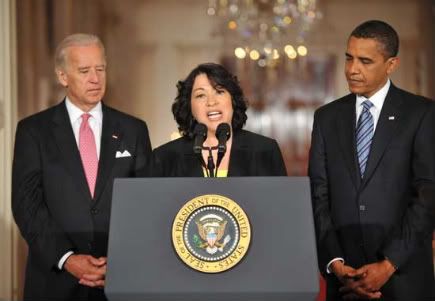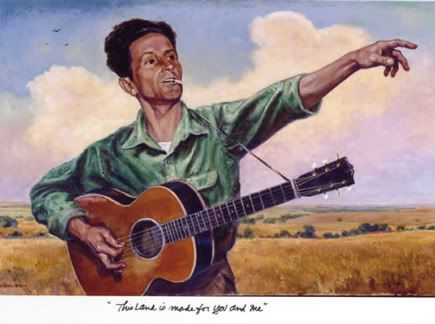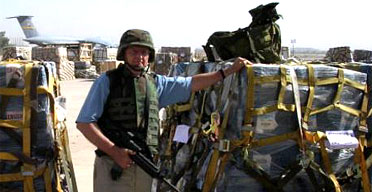is changing
soon”
Throughout the spring and summer and into the fall the signs appeared as far north as 94th street and all the way south into Walnut Glenn.
Occasionally, a sign would appear that, from the handwriting, had clearly been written by someone else. These would last no more than a day before they would be painted over or erased, but the original signs were never disturbed.
In the winter, downtown bars began to find business cards left on tables; white, with the same three lines in the same handwriting, printed on them. Nothing else.
Cards were also found at public libraries, movie theaters, and grocery stores.
After the first couple months, people were waiting for some sort of aesthetic punch line. A local band’s new album, an art installation project, something. Sometime in 2003, the appearance of new signs seemed to slow and then stop, sometime around May; possibly, it was suggested, on the anniversary of the very first sign.
The business cards also stopped around that time. Whatever cards were found were collected by local artists; someone created postcards featuring photos of the signs that were sold in some downtown shops.
An editorial, written by the pastor of a local Baptist church, appeared in the city newspaper, critical of the signs, suggesting they represented a mockery of faith. A rebuttal editorial, written by a local Unitarian minister, argued that the signs represented a belief that 19th Century Christianity was ill-suited for a 21st Century world.
Similar battles were also fought from local pulpits.
Sometime in late 2002, a group emerged on the city’s north side that believed the signs were a prediction that the Second Coming of Christ would happen in 2012. That group, labeled “Jesus 2012” by the local media, grew in size at a brisk pace, until meetings with attendance well into four figures was common.
In 2006, two sociologists at a local university conducted a study of the initial phenomenon and mapped six hundred and sixty eight original signs. During their investigation they managed to find one piece of surveillance video from a security camera in which a sign appeared on a plywood sheet covering a window of an abandoned building. In the video, a Ford van arrives at 3:11 a.m. and parks. The driver of the van can be seen looking at papers for nine minutes and eight seconds. When the van leaves, the words are now visible on the plywood; on the video no one is seen on the street coming on the sidewalk from either direction. A traffic camera at the corner, a half block from where the van had stopped, shows that the van never reached the corner.
After the study appeared, a local evangelical Christian cable access program ran a series of shows in which a handwriting analyst studied all six hundred and sixty eight of the original signs and determined that two of them were forgeries.
By the middle of 2007 nine chapters of the “Jesus 2012” group had appeared in Lexington, Louisville, Cincinnati, Columbus, Knoxville, Huntsville, Indianapolis and Kokomo. The Chicago chapter was the largest, with eleven thousand members.
Around that time “person or persons unknown” used a chain saw to cut out the sign from the plywood window cover that had been identified in the Journal of Urban Sociology article. In a separate incident, twenty-three blocks of homes were without power for two days when a squirrel chewed on an exposed wire after someone removed a transformer cover upon which a sign had been painted.
After a newspaper story about the stolen plywood, three different men were arrested for selling little plastic envelopes that each held a splinter of wood and a card that read, “PIECE OF THE TRUE SIGN - $10.”
The cover of the November 2007 issue of Christianity Today was a sheet of plywood on which was written in a familiar script, “Is Jesus Really Changing in 2012?” Also in November of 2007 a graduate committee in the Ph.D. program in religious studies at Stanford University approved the first dissertation proposal that sought to investigate the signs. The study combined semiotics and hermeneutics in its methodology. Within a year there would be over two-dozen MA and Ph.D. theses in US universities devoted to some aspect of the phenomena.
The documentary, Jesus is Changing Soon, premiered at the Cleveland Film Festival in March of 2007. The following month, Jesus 2012, opened at the San Francisco Film Festival. Both films eventually broke long-standing records held by Michael Moore for documentary sales on DVD.
During the sweeps week of 2008, the TV series, C.S.I. Miami, featured a program about the murder of an artist who had been painting “What Does Jesus Want Now?” graffiti around Miami. The murderer turned out to be the mentally disturbed daughter of a popular television evangelist.
Around the same time, the animated series, South Park, aired the episode, “Cartman is Changing His Underwear Soon” in which the character of Eric Cartman is taunted by street graffiti, eventually found to be the work of Kyle Broflovski.
In the fall of 2009 a conference, Jesus is Changing Soon: Cultural Interstices of Religion and Art, was held at the University of North Carolina at Chapel Hill where over twenty panels saw papers presented by leading scholars from around the globe. A special edition of the journal, Cultural Studies, followed, and Oxford University Press has announced a forthcoming edited collection of work culled from that conference. Borrowing from a famous routine by Lenny Bruce, spoken word artist Jello Biafra released a live CD entitled, “To” is a Preposition, “Change” is a Verb.
By the spring of 2009 there were dozens of new courses offered on the phenomenon at universities in the US and abroad.
The Jesus 2012 movement continues to grow with chapters in all fifty states, in England and Germany and a membership now believed to be over two million. When interviewed, members most often explain that they were attracted to the movement because it offers the finality of an actual expiration date. “No matters what happens,” one woman in Liverpool explained, “we will not be having this conversation in 2013.”
Most recently, reports from Saudi Arabia and Iran have surfaced describing graffiti, in both Arabic and Farsi, translated, “The Prophet is Becoming.”














